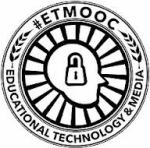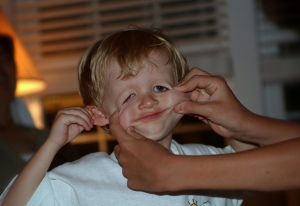We posted a video yesterday about how to set up guided access on iOS devices. I figured some viewers would immediately figure it out and no other explanation would be needed. If you have worked in educational technology you probably immediately see the potential for this feature.…
Tag Archives: education
#etmooc: A Midterm Review of Connectivity, Collaboration, and Learning
With massive open online courses (MOOCs) at the center of hype, overhype, and plenty of justifiable criticism, a midterm review of one—the highly interactive Educational Technology and Media MOOC (#etmooc, organized by University of Regina professor of educational technology and media Alec Couros and others)—shows what a well-designed and well-facilitated MOOC can offer to learners with the digital literacy skills required to benefit from them.…
Makers, Doers, and Liberation Math
There’s a growing interest out in the world in making cool things, particularly with technology. Commonly called the “maker movement,” this trend has its roots in tinkering with technology and computing in ways that move the creation of things out of the hands of manufacturers and into the hands of real people.…
Digital Literacy/Literacies 101: Doug Belshaw and #etmooc
Let’s begin exploring our quickly changing ideas about digital literacy by noting the various skills required to engage in a contemporary online learning experience: a live session (now available in an online archived version) on digital literacy/literacies led by Doug Belshaw for #etmooc, the Educational Technology and Media MOOC (Massive/Massively Open Online Course) organized by University of Regina professor of educational technology and media Alec Couros and others.…
8 Books for a Rich and Diverse Perspective on Digital Literacies
Orality and Literacy by Walter Ong – This is a classic text, describing how various societies transitioned form an oral tradition to a written tradition. Written largely before the Internet, it provides a wonderful foundation for thinking about literacy in the digital age.…
If you can’t read it, then it can’t influence you = false
If you can’t read it, then it can’t influence you. That may be true with words and books, but it is not true in a world of images, music and multimedia. With a book, if you can’t decipher the meaning of the words, then the influence is indeed limited. …
This just in: MOOCs are all the rage right now
As if you hadn’t seen the influx of moocyness over the last year.
We’re now about halfway through the #ETMOOC experience, having launched Topic 3: Digital Literacy just yesterday. In the planning for this and the Digital Storytelling topic, I’ve been trying to get the “M” in MOOC to mean more than “Massive”.…
Pinching my digital networked learning self
What’s the Value of Foreign Language?
Bolchazy-Carducci is one of the more prolific publishers of Classical texts, and they’ve done a lot of great work for Greek and Latin teachers that has helped to make our jobs easier. In their February eLitterae newsletter, Sherwin Little’s Little’s Bits column “A Latin teacher wears many hats…” addresses the complexities of a Latin teacher’s job, which often requires us to serve in part as a “public relations specialist” to help keep our numbers strong. …
The Spread of Learning Rhizomes
It would appear that the learning rhizomes are spreading uncontrollably—which, for any trainer-teacher-learner, is a wonderfully positive phenomenon.
 Having been introduced recently to what Dave Cormier calls rhizomatic learning—a connected learning process that mirrors the spreading of rhizomes so there is no center, just a wonderfully ever-expanding network of learning connections rooted in creation, collaboration, and the building of communities of learning—I now am seeing this connected learning phenomenon nearly everywhere I look.…
Having been introduced recently to what Dave Cormier calls rhizomatic learning—a connected learning process that mirrors the spreading of rhizomes so there is no center, just a wonderfully ever-expanding network of learning connections rooted in creation, collaboration, and the building of communities of learning—I now am seeing this connected learning phenomenon nearly everywhere I look.…


 (No Ratings Yet)
(No Ratings Yet)